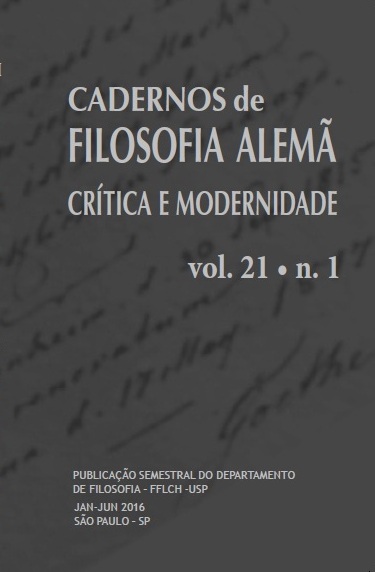Reconstrucion and immanent critique: Rahel Jaeggi and the rejection of the reconstructive method in Critical Theory
DOI:
https://doi.org/10.11606/issn.2318-9800.v21i1p13-27Keywords:
reconstruction, immanent critique, Critical Theory, ideology, emancipationAbstract
The main objective of this article is to discuss whether Habermas’s model of reconstructive criticism is a kind of immanent critique. It tries to expose and refute the position of Rahel Jaeggi, according to which reconstructive criticism is rather a kind of internal critique that has a more conservative than transforming feature. Instead, it is argued that reconstructive criticism in Habermas presents specific traits that make up a new kind of immanent critique, compared to the critique of ideology, a kind that is more connected to structuring rules of social practices.Downloads
References
Bannwart, C. J. (2012). “Teoria crítica da sociedade e evolução social”. In: Nobre, M., Repa, L. (Orgs.) Habermas e a reconstrução. Sobre a categoria central da Teoria Crítica habermasiana. Campinas: Papirus.
Celikates, R. (2009). Kritik als soziale Praxis: Gesellschaftliches Selbstverständigung und Kritische Theorie. Frankfurt am Main: Campus Verlag.
___________. (2012). O não-reconhecimento sistemático e a prática da crítica: Bourdieu, Boltanski e o papel da teoria crítica. Novos Estudos Cebrap, 93.
Habermas, J. (1976). Zur Rekonstruktion des Historischen Materialismus. Frankfurt am Main: Suhrkamp.
___________. (1984). Vorstudien und Ergänzungen zur Theorie des kommunikativen Handelns. Frankfurt am Main: Suhrkamp.
___________. (1987). Theorie des kommunikativen Handelns, vol.I e II. Frankfurt am Main: Suhrkamp.
___________. (1989). Consciência moral e agir comunicativo. Tradução de Guido de Almeida. Rio de Janeiro: Tempo Brasileiro.
___________. (1992). Faktizität und Geltung. Frankfurt am Main: Suhrkamp.
___________. (2014). Conhecimento e interesse. Tradução de Luiz Repa. São Paulo: UNESP.
Hegel, G. W. F. (2008). Fenomenologia do espírito. Petrópolis: Vozes.
Honneth, A. (2007). “Rekonstruktive Gesellschaftskritik unter genealogischen Vorbehalt”. In: Pathologien der Vernunft: Geschichte und Gegenwart der Kritischen Theorie. Frankfurt am Main: Suhrkamp.
___________. (2010). “Philosophie als Sozialforschung. Zur Gerechtigkeit von David Miller”. In: Das Ich im Wir. Frankfurt am Main: Suhrkamp.
___________. (2011). Das Recht der Freiheit. Berlin: Suhrkamp.
Horkheimer, M. (1975). “Teoria Tradicional e Teoria Crítica”. In: Benjamin, W. et alli. Textos escolhidos. São Paulo: Abril Cultural.
Iser, M. (2008). Empörung und Fortschritt: Grundlageneiner kritischen Theorie der Gesellschaft. Frankfurt am Main: Campus.
___________. (2009). “Rationale Rekonstruktion”. In: Brunkhorst, H., Kreide, R., Lafont, C. Habermas-Handbuch. Stuttgart: Metzler.
___________. (2013). Desrespeito e revolta. Sociologias, 33.
Jaeggi, R. (2008). Repensando a ideologia. Civitas, 8(1).
___________. (2014). Kritik von Lebensformen. Frankfurt am Main: Suhrkamp.
Kneer, G. (1990). Die Pathologien der Moderne. Zur Zeitdiagnose in der Theorie des kommunikativen Handelns von Jürgen Habermas. Opladen: Westdeutscher.
Nobre, M. (2004). A teoria crítica. Rio de Janeiro: Zahar.
___________. (2013). “Reconstrução em dois níveis. Um aspecto do modelo crítico de Axel Honneth”. In: Melo, R. (Org.). A teoria crítica de Axel Honneth: Reconhecimento, liberdade e justiça. São Paulo: Saraiva.
Nobre, M., Repa, L. (Orgs). (2012). Habermas e a reconstrução. Sobre a categoria central da teoria crítica habermasiana. Campinas: Papirus.
Pedersen, J. (2008). Habermas’ method: rational reconstruction. Philosophy of social sciences, 38(4).
Peters, B. (1996). “On reconstructive legal and political theory”. In: Deflem, M. Habermas, Modernity, and Law. Londres: Sage Publications.
Repa, L. (2008). “Reconstrução racional e filosofia da história”. In: Martins, C. A., Poker,J. G. O pensamento de Habermas em questão. Marília: Oficina Universitária Unesp.
___________. (2008a). A transformação da filosofia em Jürgen Habermas: os papéis de reconstrução, interpretação e crítica, São Paulo: Singular.
Stahl, T. (2013). Habermas and the Project of Immanent Critique. Constellations, 20(4).
Strydom, P. (2011). Contemporary Critical Theory and Methodology. London/New York: Routledge.
Voirol, O. (2012). Teoria Crítica e Pesquisa Social: da dialética à reconstrução. Novos Estudos Cebrap, 93.
Downloads
Published
Issue
Section
License
Information and conceptions on the texts are complete responsibility of the authors.
All the articles submitted before July 5th 2018 and those published after July 2021 are licensed under a CC BY-NC-ND license – except those published between the aforementioned dates, which are under the CC BY-NC-SA license. The permission for the translation of the material published under the license CC BY-NC-ND by third parts can be obtained with the consent of the author.
Open access policies - Diadorim
Rules applied before July 5th 2018:
Presenting a submission to our Editorial Board implies granting priority of publication for “Cadernos de filosofia alemã”, as well as transferring the copyright of texts (once published), which will be reproduced only with the manifest authorization of the editors. Authors keep the right to reuse the texts published in future editions of their work, without paying any fees to "Cadernos”. We will not grant the permission to re-edit or translate the texts for third parts without agreement of the author.


